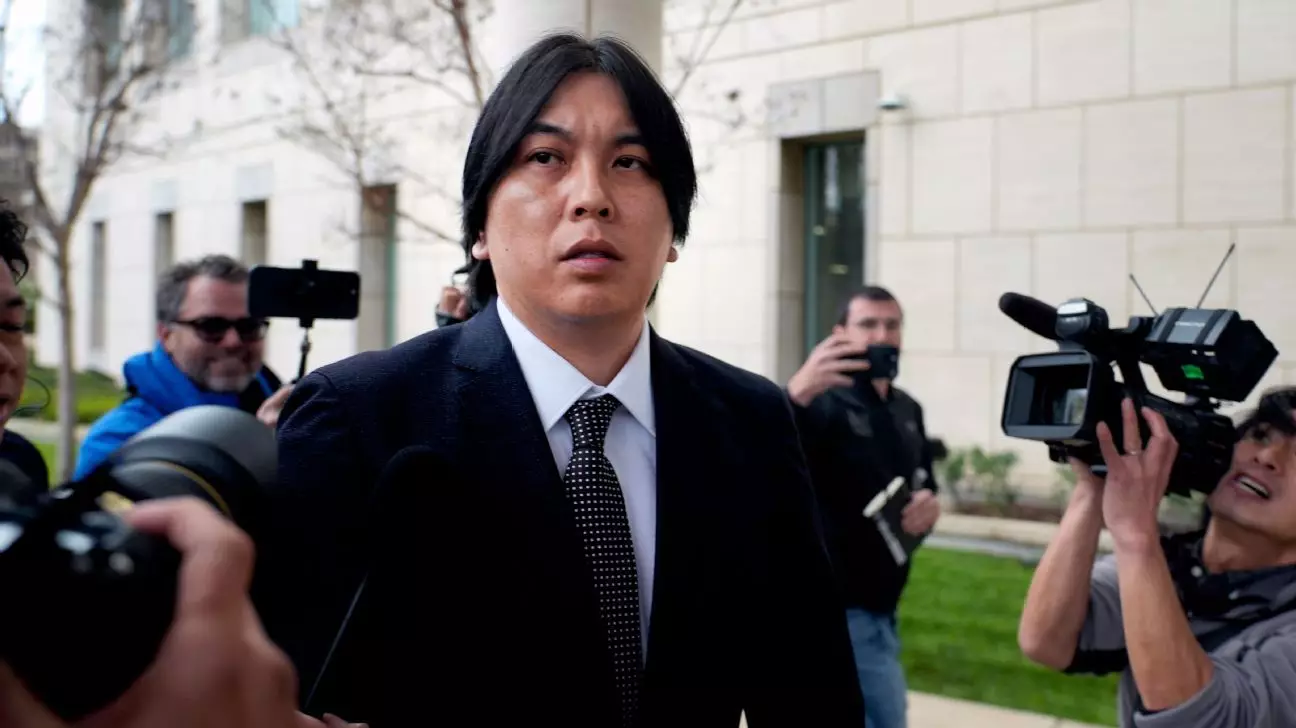In a striking turn of events, Ippei Mizuhara, a former interpreter for Los Angeles Dodgers’ star Shohei Ohtani, has been sentenced to 57 months in prison for committing an audacious theft amounting to nearly $17 million. This case brings to light the devastating impact gambling addiction can have on individuals and the betrayals that often accompany it. Mizuhara’s story is not just that of a man who succumbed to temptation, but also a clear demonstration of how trust can be exploited in ways that ripple far beyond mere financial losses.
Mizuhara’s gambling addiction seemingly spiraled out of control, drawing in vast sums of money that not only transgressed personal ethical boundaries but also violated the trust placed in him by Ohtani. The former interpreter, described as a confidant of Ohtani, had an enviable position that many would dream of; however, he transformed this golden opportunity into a personal nightmare marked by betrayal and financial ruin.
The courtroom painted a vivid picture of betrayal as U.S. District Judge John W. Holcomb issued the sentence. “The magnitude of the theft — $17 million — in my view, is shockingly high,” he remarked, underscoring that this sum is often beyond what many would earn in a lifetime. Mizuhara had utilized his closeness to Ohtani to facilitate his scheme, executing wire transfers from the superstar’s account to an illegal bookmaker, which raises significant ethical questions about his character and decisions.
This breach of trust is a bitter pill for Ohtani who, as the victim of this crime, not only faces financial repercussions but also the emotional toll of being deceived by someone he trusted deeply. The pain of betrayal can be lingering and profound, leaving scars that are often invisible yet deeply felt. Mizuhara’s actions not only depleted Ohtani’s finances but also sullied the image of camaraderie often associated with professional sports.
In the aftermath of these events, Mizuhara has pleaded guilty to charges of bank fraud and filing a false tax return, admitting to placing an astonishing 19,000 bets and building over $40 million in debt. It is a chilling encapsulation of how easily one can be ensnared by the vices of addiction, drowning in debt while simultaneously steering an esteemed career into turmoil.
Despite his attorney’s arguments highlighting Mizuhara’s addiction, the prosecution emphasized the lack of substantial evidence indicating that gambling was a significant issue for Mizuhara prior to the infractions. This raises larger questions about accountability and the ethical obligation that comes with trust. Can an addiction truly justify the exploitation of one’s position? As Mizuhara now prepares for deportation upon serving his sentence, the discussion of culpability remains pertinent.
Lessons from a Cautionary Tale
What this case serves to remind us is not merely the consequences of gambling addiction but also the legacy of trust that can be shattered by a single individual’s choices. Joseph T. McNally, acting U.S. Attorney for the Central District of California, framed this as “a sad tale of an American success story gone wrong.” It prompts reflection on how swiftly success can collapse under the weight of personal demons, and how important it is for systems to be in place that safeguard against such betrayals.
Moreover, it raises awareness about the often-hidden perils of addiction within high-stakes environments. Whether in sports, business, or any field where trust is currency, vigilance against ethical breaches, and understanding the complexity of addiction are crucial for safeguarding relationships and maintaining integrity.
The Ippei Mizuhara case serves as a stark reminder of the vulnerabilities that exist beneath even the most successful façades. It highlights the human capacity for greed and deceit, coupled with the tragic outcomes that follow. As we unpack this multifaceted narrative, it becomes ever more crucial to prioritize mental health support and ethical integrity in all domains of life, ensuring that trust remains a cornerstone of our interpersonal and professional relationships.


Leave a Reply